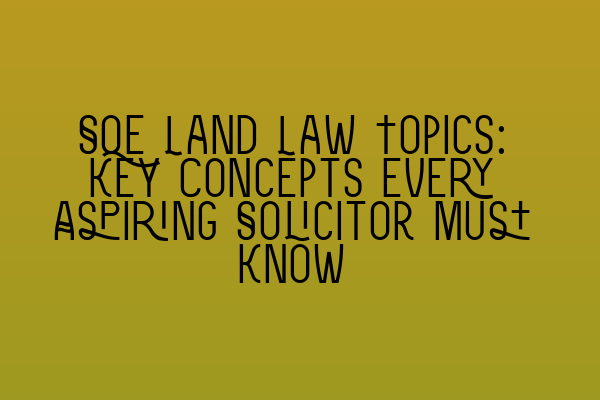SQE Land Law Topics: Key Concepts Every Aspiring Solicitor Must Know
Welcome to SQE Property Law & Land Law! As a respected solicitor, writer, and SEO expert, I am committed to providing you with valuable insights into the intricacies of land law. In this comprehensive blog post, we will delve into the key concepts that every aspiring solicitor must know to excel in the field of land law.
But before we dive into the fascinating world of land law, let me take a moment to introduce you to our related articles:
- Interactive SQE Mock Tests for Contract Law: Test Your Knowledge
- Contract Law Reforms: An Analysis of Recent Changes
- Parties in a Contract: Rights and Responsibilities
- The Importance of Ethics in Contract Law: A Comprehensive Guide
- Unveiling Duress and Undue Influence in Contracts
The Foundations of Land Law
Land law forms the bedrock of property law, governing the rights, interests, and obligations associated with land ownership. As an aspiring solicitor, a solid understanding of these key concepts is essential to navigate the complexities of this area of practice.
Freehold and Leasehold
One of the fundamental distinctions in land law is the difference between freehold and leasehold interests. Freehold represents absolute ownership of land, while leasehold involves the ownership of land for a fixed period of time, subject to certain conditions and limitations.
It is crucial to grasp the nuances of freehold and leasehold so that you can provide expert advice to clients seeking to buy, sell, or lease property.
Easements and Covenants
Easements and covenants are important legal concepts governing the rights and obligations associated with the use and enjoyment of land. Easements grant a non-possessory interest in another person’s land, such as a right of way or a right to light.
On the other hand, covenants are legally binding promises that impose restrictions or obligations on the use of land. Understanding the nature and enforceability of easements and covenants is key to advising clients on property transactions.
Registered and Unregistered Land
In the UK, land can be either registered or unregistered. Registered land is governed by the Land Registration Act 2002 and is subject to a centralized system of record-keeping, providing greater certainty and ease of conveyancing.
On the other hand, unregistered land relies on a system of title deeds and is governed by common law principles. Understanding the distinctions between registered and unregistered land is crucial to ensuring smooth and efficient property transactions.
Landlord and Tenant Relationships
An important aspect of land law pertains to the relationship between landlords and tenants. Whether you are advising a landlord on lease agreements or assisting a tenant facing eviction, a strong grasp of landlord and tenant law is essential.
Tenancy Types
There are various types of tenancies, including assured shorthold tenancies, secure tenancies, and business tenancies. Each tenancy type carries with it a unique set of rights and obligations for both landlords and tenants.
By understanding the different tenancy types, you can provide tailored advice to clients seeking to establish successful landlord and tenant relationships.
Termination of Tenancies
The termination of tenancies can be a complex area of law, with specific notice requirements and grounds for eviction. As a solicitor, it is crucial to be familiar with the procedures and legal obligations involved in terminating a tenancy.
By ensuring compliance with the appropriate legal procedures, you can protect your clients’ interests and avoid any potential legal pitfalls.
Property Development and Planning Laws
Property development and planning laws play a critical role in determining the permissible uses, restrictions, and permissions associated with land and property. As an aspiring solicitor, understanding these laws is essential when advising clients on property development projects.
Planning Permission
Obtaining planning permission is a vital step in any property development project. Familiarize yourself with the local planning laws, regulations, and procedures to guide clients through the intricate process of securing planning approval.
Restrictive Covenants
Restrictive covenants can limit the use and development of land. It is crucial to identify any existing restrictive covenants on the land to ensure compliance and avoid potential legal issues in property development projects.
Conclusion
Congratulations on completing this in-depth exploration of key concepts in land law! By immersing yourself in these essential topics, you are taking important steps towards becoming a successful solicitor in property law.
Now that you have a comprehensive understanding of the foundations of land law, landlord and tenant relationships, and property development and planning laws, you can provide expert advice to clients and navigate the complexities of this fascinating area of practice.
Don’t forget to check out our related articles for further insights into contract law:
